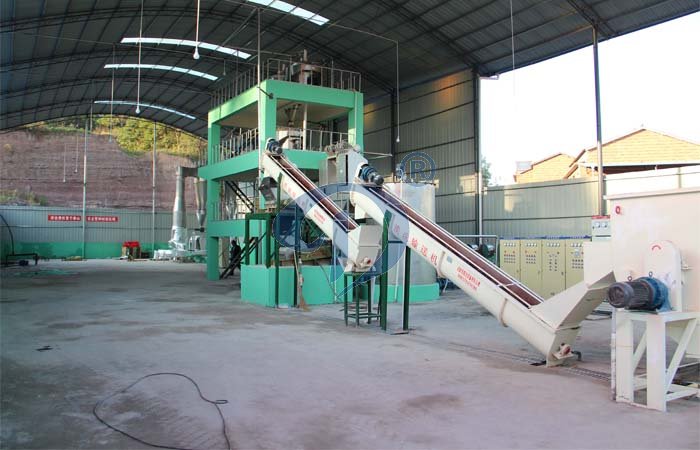 Tel/WhatsApp
Tel/WhatsApp
Is potato starch gluten free?

potato starch processing line
Gluten-free and an effective thickener, potato starch gives people who suffer from gluten intolerance or celiac disease a viable alternative to wheat-based thickeners. Also known as potato flour, potato starch only needs cold water and heat to gelatinize, unlike wheat thickeners, such as flour, which need fat.
Potato starch processing
Potatoes after cleaning, crushing,centrifuging, concentrating & refining, dewatering and drying will be processed in potato starch. Potato starch is a natural substance, but producers use a sodium-bisulfite solution or sulfur-dioxide gas to prevent oxidation, so it isn't organic.
Potato starch properties
Potato starch reacts differently to heat, fat and water than wheat starches do. You can add potato starch to soups and sauces via a slurry, or equal parts potato starch and cold water -- no fat needed. Gluten starches, on the other hand, such as flour, need fat to separate the granules and prevent clumping to gelatinize, or swell, effectively. Although potato starch is an effective thickener on par with wheat-based starches, it doesn't have as much stability and rapidly breaks down when exposed to boiling temperatures. Potato starch also has a pronounced taste, so you must cook the liquid you add it to for a few minutes to "cook" the potato flavor out, but you can't let it boil when doing so. This isn't a problem with wheat-based starch because fat stabilizes them. So, although you can get effective thickening for less fat and calories with potato starch, you have to handle it more delicately than starches that contain gluten.
How to use potato starch?
You have to accommodate for potato starch's instability when using it as a thickener, which means adding it at the very end of cooking. Add 1 tablespoon of potato starch mixed with 1 tablespoon of cold water for every cup of soup or sauce and whisk it in, then cook for about five minutes -- without letting it reach a boil. Soups and sauces thickened with potato starch will thin out if you reheat them.
-
 Fufu Production Line Layout in Cassava Processing Plant
Fufu Production Line Layout in Cassava Processing Plant
-
 Henan Jinrui Four Types of Dehydration Equipment for Cassava Processing Introduction
Henan Jinrui Four Types of Dehydration Equipment for Cassava Processing Introduction
-
 Entire chain of automatic fufu flour production line
Entire chain of automatic fufu flour production line
-
 Functions and advantages of centrifuge sieve in potato starch purification line
Functions and advantages of centrifuge sieve in potato starch purification line
-
 Manufacturing cycle time of Henan Jinrui's tapioca starch purification equipment
Manufacturing cycle time of Henan Jinrui's tapioca starch purification equipment
-
 How Rasper Helps Increase the Efficiency and Productivity for Starch Production
How Rasper Helps Increase the Efficiency and Productivity for Starch Production
-
 Advantages of Henan Jinrui's Flash Dryer for Cassava Flour and Starch Production
Advantages of Henan Jinrui's Flash Dryer for Cassava Flour and Starch Production
-
 How Much Workshop Area is Needed for a Cassava Flour Plant? How to Place the Layout?
How Much Workshop Area is Needed for a Cassava Flour Plant? How to Place the Layout?
-
 How to Ensure the Smooth Operation of Starch Processing Equipment?
How to Ensure the Smooth Operation of Starch Processing Equipment?
-
 Common bottlenecks and solutions of cassava flour production
Common bottlenecks and solutions of cassava flour production
-
 Garri Processing Equipment: A Deep Dive into Production Costs and Profitability
Garri Processing Equipment: A Deep Dive into Production Costs and Profitability
-
 Doing Factory Ships High-Quality Garri Processing Equipment to Nigeria
Doing Factory Ships High-Quality Garri Processing Equipment to Nigeria
-
 Selling High-Quality Cassava Processing Equipment to Uganda
Selling High-Quality Cassava Processing Equipment to Uganda
-
 Gari processing line successfully shipped to Nigeria
Gari processing line successfully shipped to Nigeria
-
 Cassava starch fine fiber sieve purchased by Indian client
Cassava starch fine fiber sieve purchased by Indian client
CONTACT US
DOING company offers cassava processing machine from single machine to the complete production line. If you want to get more details about cassava processing machine, please contact us:
- Do you want to buy machine?
- Yes, I want to buy machine
- No, I Just learning
- What is your raw material?
- Cassava
- Potato
- Sweet potato
- Others
- 2. What is the final product you want to produce?
- Garri
- Cassava flour
- Cassava starch
- Cassava chips
- Attiekie
- Bammy
- Others
- 3.What is your capacity plan?
- Small scale garri machine
- 1ton per day
- 2tons per day
- 3tons per day
- 10tons per day
- 20tons per day
- Others
- 3.What is your capacity plan?
- Small scale
- 5tons per day
- 10tons per day
- 20tons per day
- 50tons per day
- 100tons per day
- Others
- 3.What is your capacity plan?
- Small scale
- 5tons per day
- 10tons per day
- 20tons per day
- 50tons per day
- 100tons per day
- 200tons per day
- 300tons per day
- Others
- 3.What is your capacity plan?
- Small scale
- Middle type
- Large scale
- What is your capacity plan?
- Small scale
- 5tons per day
- 10tons per day
- 20tons per day
- 50tons per day
- 100tons per day
- 200tons per day
- 300tons per day
- Others








